The Micras Chessboard

The Micras Chessboard is a story series by Gustaaf Vermeylen. The story series starts with a follow-up story to "Arkadius and Clara: A Royal Love Story". The first series runs until 1687 AN, when the Emir of Arbor had awakened from his coma. In 1690 AN the second series began, which was republished on Micraswiki. The first series was removed between 1685 and 1690 AN and can only be read on the forum of Arbor.
First series
The stories surrounding the first series are considered over and over. Those stories can be read here.
Second series
In search of Jorvik
Now that Amir's mission is mainly focused inland, the share of the Arboric fleet has been reduced. The admiral, Edward Krüger, went on audience with the Sultan to discuss his role. He was impressed that a brand-new nation such as Çakaristan was working so energetically on nation building. His men were giving training to the navy of Çakaristan, which was partly made up of the former navy of Krasnocoria. But the threats from abroad had not increased to justify the stay of the entire fleet. Before asking the Emir of Arbor to call the fleet home, he wanted to consult the Sultan.
In the Red Fortress the admiral was received and the men embraced each other as good friends. Rank and etiquette were out of the question. Edward made his ideas known to Abu. "With all love, I will stay with my fleet in Hisn Mahmud, but this weighs on the budget. If you know a useful contribution for the fleet, the fleet is still useful," said Edward. Abu replied: "It is true that the usefulness and necessity has diminished, but to send you home, I would rather not have that yet. But had you not expressed a desire recently?” Edward looked strangely for a moment, but soon remembered what Abu meant. "You mean, that I would like to visit the former city of Jorvik? Or what's left of it," said Edward. "Yes," Abu replied, "that's what I mean, maybe I should send you on a mission". Edward began to smile and said: “I would like to do that mission”. "Then I'm going to tell you, my friend", Abu concluded.
A few days later, the convoy of some double-flagged ships, the flag of Arbor and the flag of Çakaristan, left. Along the east coast of Kendall Isle was the first part of the journey. The convoy then turned north-east. When the 30th parallel was passed, the convoy headed north, the Strait of Pearls, Edward noticed that environment was changing. No other ships could be seen on the radar. If they had a view of land, there was no activity. Once this strait was busier, because Edward had sailed to Jorvik as a sailor. Although the west coast of Keltia was largely unclaimed, the east coast of Apollonia was under Storish flag. The city of Jorvik was under the Frankish flag, and in the latter days of Stormark the surrounding area of Jorvik also came under the flag of Stormark. The intention was that the surrounding area would be donated to Francia. His Emir, the then Frankish Kaiser, was Lord in Jorvik. That time is over, both Francia and Stormark have become history.

Yet Edward wanted to know what remains of the city of Jorvik. He was glad that the Sultan had ordered him to carry out this mission in order to satisfy that curiosity. It took some time before the fleet reached its destination. But also here it was quiet, only Edward received reports that the country was not empty. There was human activity, on which Edward sent scouts. Edward himself went ashore by landing craft near the former city of Jorvik. He found a city in great decay. One of his soldiers wanted to plant a Çakari flag on a high spot. "No", ordered Edward, "we are not going to colonise this country. We are not going to claim it, unless it is done with the consent of the local people and in agreement with the local leaders". The soldier did what the admiral said and did not plant the flag. A scout came back and reported to the admiral that there was habitation to the north. A nation in formation. Edward thought this was good news, he said: “Let's go and meet them, then perhaps we can initiate diplomatic relations with them”.
In this way Edward set course in a northerly direction. He flanked his vehicles with white flags to express his peaceful intentions. Not much later there was the first encounter with soldiers. One of Edward's scouts had already made contact, so the arrival of the admiral was no surprise. The soldiers were in contact with their headquarters, so the admiral was asked about his intentions. Edward told that he came to offer friendship with the Sultan of Çakaristan. Not much later Edward was escorted to a city, which turned out to be the capital of a nation in the making, the Holy Kingdom of Nordia. He no longer had to fly white flags, but was allowed to fly the flag of Çakaristan.
In Küfara Edward was received with all esteem. Edward conveyed the warm greetings of the Sultan and expressed his hope for friendly relations between the two nations. He was invited to appear before Her Royal Majesty and His Holiness. There he told about the Sultan of Çakaristan and the Emir of Arbor. He told about the developments of the young nations that had arisen after the disastrous year of 1685 AN. He told about Çakaristan's membership of the Union of States around the Sovereign Oceans. He expressed the hope for friendship and a prosperous future. The listeners were impressed and the diplomats were immediately put to work to draw up a treaty, so that the basis for that friendship was laid between Nordia and Çakaristan.
Edward thought he had found a ruin, but found a building site. A new nation was being built, laying the foundations for a new friendship.
Blossoms of culture
The Emir was not ungrateful for the efforts made after the fall of the Franco-Batavian Empire and the foundation of the Emirate of Arbor. He did not really feel like a global leader anymore. He began to long to leave the Al-Hamra Palace and explore his new country. Although he was not that old yet, his body had suffered a huge blow from the coma. He seemed at least twenty years older. He knew not to complain, he was lucky. A chance to see his children grow up. He missed his three eldest children, but there was secret contact.
His wife saw that he was struggling with the situation. She acknowledged that the liveliness had gone out of her husband, but was glad he was still there. When she found him, sitting on a balcony in deep thought, she suggested he go to Madinat al-Fath. There a new orchestra is going to give a concert, it would be an honour for them that the Emir is there. The Emir was delighted with the idea. So he had everything prepared to leave the Al-Hamra Palace for the first time after his coma. The bodyguards were not happy with the idea, but obeyed. Accompanied by jet fighters, the Emir flew to Madinat al-Fath. There the arrival of the Emir was received enthusiastically. For the first time since the foundation of the emirate, the Emir visited this city, the largest in the country. A palace had also been built here. A lot more modest than the Al-Hamra Palace, but certainly fitting for an emir.
People were cheering all the way to the palace. The Emir did a good job. These people still believed in him. That evening the Emir went to the concert hall, where he met the orchestra and choir. The composition of the orchestra and choir reflected the composition of the population of the Emirate. Arcadian Batavians, Arbors, Franks, etc. After a drink in the foyer, the Emir was escorted to the balcony. Those present stood up when he entered. He gestured that everyone could sit down, but instead the crowd applauded. The Emir was moved. After the audience finally sat down, the orchestra and choir began:
| Arboric | Transliteration | Translated in Common Tongue |
|
لما بدا يتثنى لما بدا يتثنى |
lamaa bada yatathanaa lamaa bada yatathanaa |
She walked with a swaying gait |
Exotic unknown

Satisfied, Ana al-Zamard walked out of a government building in Tiegang. She had just had a successful meeting, in which she had spoken to the government in Tiegang on behalf of the Sultan of Çakaristan to build a railway line between Tiren and Tiegang. There goods trains could continue on the old Krasnocorian railway network. In this way Tiegang could become a port of access for the sultanate. She walked to her favourite coffee house, ordered her favourite coffee and wrote something in her personal booklet. A man at another table saw her sitting and came walking towards her. "Excuse me, are you Mrs al-Zamard?", the man asked. She nodded and gestured to the empty chair on the other side of her table. "My name is Pete Knight, I'm from Ralgon". "What brings you here?", asked Ana. Pete replied: "As you may know, my country has a share in this town. But what I wanted to speak to you for is: I have heard that the sultanate needs all kinds of goods. I know there are trade opportunities in The Hexarchy'. Ana thought for a moment and said: 'Why don't you take this opportunity yourself? Pete replied: 'My country and I do not currently have the opportunities to seize this opportunity. Our aspirations lie in Cibola. But I don't want to leave our friends from The Hexarchy alone". Ana nodded and invited Pete to join us for a cup of coffee.
A few days later, Ana was on the deck of the ship, the Blue Emerald. The salty sea breeze was blowing through her hair. She enjoyed being at sea again. She thought of the happy moments with her deceased husband. Their time on their luxury yacht, like newlyweds. She missed him. The captain coughed to awaken her from her thoughts. She smiled nervously and made it clear that she was listening. "We are approaching Kobol, my lady," said the captain. She looked ahead and saw the city. This city is only a stop and after a day they carry on. Now they are going up the river in the direction of Marduk. The depth sonar was switched on to control the draught. There were no depth maps of this river available. Because of this they arrived successfully in Marduk.
The gangway was plotted, after which Ana set foot ashore. To the southwest of the city lies brave the giant forests, and to the north and after that west for a more traditional hunting expedition. Through the market Ana walked on to the trading house. In this way Ana was able to make contact with suppliers of exotic fruit. There was a need for this in the sultanate. She cost a few tons of it, which was to be loaded onto her ship. With a government official she discussed the trade possibilities between The Hexarchy and Çakaristan. She was told about the USSO common market, the opportunities for Çakaristan. She promised to present that to the sultan.
The next day, when the ship was fully loaded, the ship left without her. Ana was on her way to the airport. There was a silver-coloured propeller plane ready with destination Alpazkigz.
Ana, the dealmaker
The plane landed in Alpazkigz, Ana got out and took a taxi to the city. The mystical atmosphere seemed to distract her from her goal. The unrest surrounding the decline of Bassirid areas is noticeable in the city. Yet she managed to make a deal with a timber merchant. Keltian hardwood is purchased and shipped to Arbor. There is a great need for timber for the construction industry. The desert-like Arbor has insufficient production of wood, which spares the Arbor Isles. That is to preserve the sacred islands.
In order to escape the unrest and move on to her next deal, Ana flew to South City. The Passian city is the oil capital of Keltia. There, the president of Carol Stream Oil sat at the other side of the table, while next to Ana sat a delegation from the remaining Arcadian Oil Company. Can you explain what the Arcadian Oil Company can do for us?", asked the president of Carol Stream Oil. Ana gestured that the man on her right could answer that question. The man scraped his throat and said: "Arcadian Oil Company has already distinguished itself in the technique of producing synthetic oil. There was a factory in Cruoninga, but a new factory is under construction in Fatehpur. But what he came here for is that we read about contaminated oil in your annual reports. We have developed a technique to clean that polluted oil and distil marketable oil from it. We would like to work together to help you with that contaminated oil". The President raised his eyebrows when he heard that his annual reports had been studied, he was somewhat sceptical because the production of synthetic oil affects the decline in oil. But he was interested in the technique presented for cleaning oil and making it saleable. It did not take long before a deal was made.
While the Arcadian Oil Company delegation was preparing to execute the deal, such as setting up a local office and purchasing a plot of land for a factory, Ana flew to Gondolin. There Pieter-Jan Terlinck, CEO of the Batavian Trading Company, had arrived. Together with Ana they made an agreement with local gold mining companies. The Batavian Trading Company has years of experience in safely transporting gold. The directors of the gold mine companies wanted to know how the Batavian Trading Company works. Pieter-Jan Terlinck replied: "I cannot tell you the exact details, because the fewer people know about it, the better. But it is no secret that we have our own militia, this is not allowed here. We need safe transport'. This did not curb the curiosity of the directors, but there was no more substantive information. Despite this, the deal was closed and the Batavian Trading Company opened an office in Gondolin. An office in Nova Victoria was due to open a month later.
Again Ana got on the plane, but this time she flew to Shanbao. There she had a meeting with the director of Jingdao National Petroleum. The recent discoveries of natural gas in the Jingdaoese waters of the Antican Sea led the Sultan to the idea that natural gas might also be found in the Çakari waters. In the absence of know-how in Çakaristan, a deal with the Jingdao National Petroleum is the quickest way to carry out exploratory drilling. And if natural gas is found, this is also the quickest way to extract it. In fact, the allies of the USSO had an agreement fairly quickly. The agreement in principle was signed, which would later be in the 'Antican Sea Treaty'. "So", said Ana, "it is time for a holiday". She flew to Agra, to travel there by train from the Çakar Riviera.
Storish armada
He had followed his brother's coronation on television. He had mixed feelings, as he would have liked to remain King of Batavia. But that was no longer feasible. He regretted that his daughter was not crowned. But if it were true that she was not his daughter, then crowning her would be a historical mistake. He resigned himself to the situation. He sent congratulations to his brother to let him know that he was resigned to the situation.
One day, he looked out over the harbour from the palace balcony. There was a bustle of activity. In the harbour of Madinat al-Fath it was a hive of activity. Ships moored or sailed away. An unending stream of traffic, accompanied by the sound of horns. It suddenly struck him that there was a large shed in the harbour, where he had not seen any activity. But now he will see a van standing next to the shed, quickly he grabbed a pair of binoculars and looked to see what was about to happen. Soldiers walked in and out, carrying tools, but did not take or bring anything. He asked a footman what the shed was for. The footman replied that the shed was one of the storerooms of the Storish armada's equipment. Suddenly the Emir remembered that with the arrival of a large group of Stormarkians, a large armada arrived with military equipment. The Emir ordered to show him the hangar and hurriedly that visit was organised. When the Emir visited the shed, he asked why this equipment was here. "It's a good thing we are not at war, one bomb on this shed and this city will be wiped off the map", judged the Emir. The army commander had to agree with the Emir, but that there is just not enough space to store all the equipment. The Emir thought and asked, "Is there a list of all the equipment?" The army commander nodded and took out a thick file. He gave it to the Emir, who leafed through the file with great amazement.
A few days later, the Emir attended a meeting of the government. The Emir heard about the civil war in Elwynn. Some members of the government felt like interfering or taking the side of the Republic of Elwynn and Amokolia. While others fervently pleaded not to interfere in the conflict. "Nobody is waiting for us", said one of the government members. The Grand Vizier turned to the Emir and looked at him questioningly. The Emir said, "We have enough material. For the first time I saw the list and some of the equipment from Stormark. All that equipment is maintained, but not used. So it's lying around aging, waiting to be thrown away." The Emir paused for a moment, while the pacifist government members sat restlessly on their chairs. "But, we do not have the manpower to use and deploy the equipment in a military action on Benacia. In short, we will not go to war." The government members who did want to fight were disappointed, but respected the Emir's decision.
"We can't use the equipment, it's outdated and we don't need it. So what do we do with it?", the Grand Vizier asked. The Emir replied, "There is a nation with enough manpower to use the equipment: Çakaristan." "All of it?", asked the Grand Vizier. "Everything," replied the Emir. The Emir dictated a letter to the Sultan, outlining the considerations for giving the equipment to him. A summary list was attached:
| Name | Origin | Type | Quantity | Photo | Notes | |
|---|---|---|---|---|---|---|
| Guns | ||||||
| Stormark 18C | handgun | 435,920,704 | 
|
|||
| Stormark 11-87 | shotgun | 445,667,994 | ||||
| Hand grenades | ||||||
| Stormark HG85 | fragmentation grenade | 8,353,991,676 | 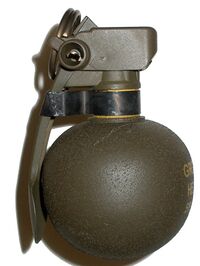
|
|||
| Machine guns | ||||||
| Stormark MG90 | machine gun | 428,186,941 | 
|
|||
| Stormark MG78 | medium machine gun | 7,992,623 | 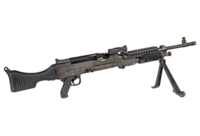
|
|||
| Stormark MG88 | heavy machine gun | 13,231,870 | 
|
|||
| Stormark APC9 | submachine gun | 493,874,114 | 
|
|||
| Rifles | ||||||
| Stormark HK416 | carbine | 418,311,042 | 
|
|||
| Stormark HS50 | long-range sniper rifle | 894,865 | 
|
|||
| Stormark 110 BA | sniper rifle | 2,559,908 | ||||
| Stormark Tikka T3 | rifle | 431,842,505 | 
|
|||
| Stormark M84 | recoilless rifle | 10,016,976 | 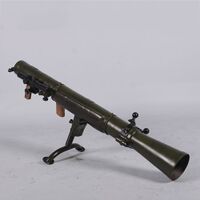
|
|||
| Rockets and grenade launchers | ||||||
| Stormark HK | grenade Launcher | 13,518,728 | 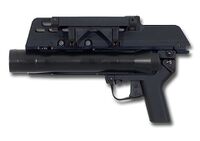
|
|||
| Stormark GMG | automatic grenade launcher | 10,712,021 | 
|
|||
| Stormark RB-57 | light anti-tank weapon | 15,770,683 | 
|
|||
| Stormark AT4 | rocket projectors | 3,166 | ||||
| Vehicles | ||||||
| Stormark S122 | main battle tank | 7,716 | 
|
|||
| Stormark 9040 | light armoured vehicle | 279,548 | 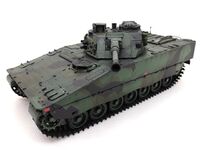
|
|||
| Stormark P360 | armoured vehicle | 39,253 | 
|
|||
| Stormark RG-32 | mine-protected vehicle | 27,717 | 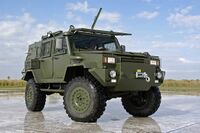
|
|||
| Stormark Hilux | light utility vehicle | 251,184 | 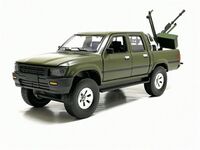
|
|||
| Stormark S90 | armoured combat support vehicles | 1,340 | 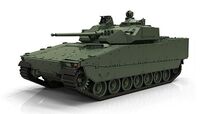
|
|||
| Stormark T-15 | infantry fighting vehicles | 24,828 | 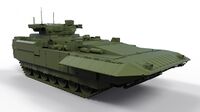
|
|||
| Stormark AAV | amphibious assault vehicles | 20,015 | 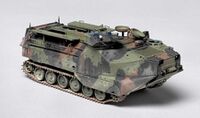
|
|||
| Stormark AAS | self-propelled artillery | 4,150 | 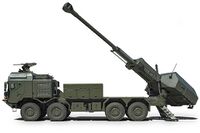
|
|||
| Stormark TRF1 | towed artillery | 2,703 | 
|
|||
| Stormark OTO | anti-aircraft vehicles | 5,161 | 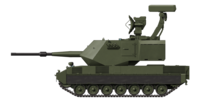
|
|||
| Stormark RMMV HX | truck | 236,305 | 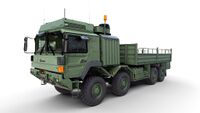
|
|||
| Stormark UCV | unmanned combat vehicles | 17,268 | 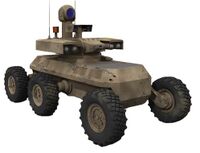
|
|||
| Fighter jets | ||||||
| SAC J39 „Fljúgandi Griffin“ | multirole fighter | 2,050 | 
|
|||
| SAC J39a „Fljúgandi Griffin“ | multirole fighter | 1,250 | 
|
Assigned to the navy, adapted for aircraft carrier | ||
| Helicopters | ||||||
| Stormark NH90 | multi-role helicopter | 180 | 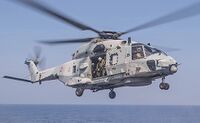
|
|||
| Stormark 109E | multi-purpose helicopter | 200 | 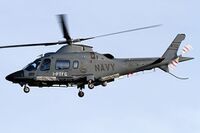
|
|||
| Transport aircrafts | ||||||
| Stormark C295 | propeller plane | 30 | 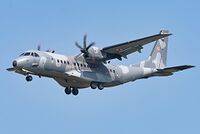
|
|||
| Amphibious transport docks | ||||||
| Stormark L800 | landing platform dock | 6 | 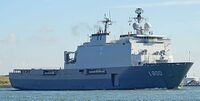
|
|||
| Aircraft Carriers | ||||||
| Stormark C550 | aircraft carrier | 15 | 
|
Nuclear powered, with in total 1,275 fighter jets | ||
| Stormark LPH6111 | landing helicopter docks | 3 | 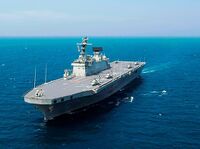
|
|||
| Arsenal ships | ||||||
| Stormark ZZ1000 | arsenal ship | 45 | 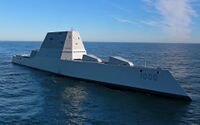
|
|||
| Littoral combat ships | ||||||
| Stormark LCS2 | littoral combat ship | 76 | 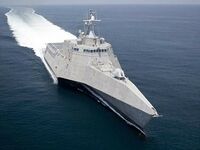
|
|||
| Stormark LCS17 | littoral combat ship | 194 | 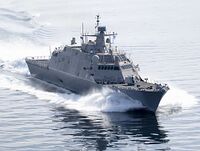
|
|||
| Cruisers and destroyers | ||||||
| Stormark T101 | guided-missile cruiser | 66 | 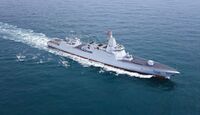
|
|||
| Stormark T172 | guided-missile destroyer | 99 | 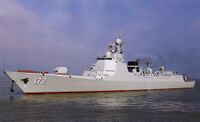
|
|||
| Fast combat support ships | ||||||
| Stormark T901 | fast combat support ship | 21 | 
|
|||
| Submarines | ||||||
| Stormark T1048 | submarine | 81 | 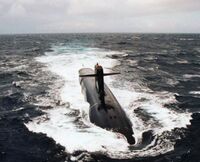
|
nuclear powered | ||
In the name of the king
Together with his son Pieter-Jan Terlinck had an audience with the king. It was a great honour for him to meet the newly crowned king. They were escorted through the corridors of the palace. Pieter-Jan Terlinck had been here before, then at the audience of the older brother of the current king. Then they were led into the king's study. It was a small room, a different room from the office of Arkadius IV. The king was typing on a laptop, while they waited in front of the king's desk. "So," the king said as he pressed enter with a cheerful wave. "How nice that you are here", the king continued. "The honour is on our side", Pieter-Jan Terlinck replied.
The king smiled and said, "You know where I was born?" "Yes, Your Majesty, in Schaarlecht," Pieter-Jan Terlinck replied. "Correct," the king continued. "My family had an estate near Schaarlecht. It is already bad that the Beneluccas had fallen, but then came foreign nation who occupied the archipelago. Now the archipelago has fallen to the Green again. Only now the northern island will probably be occupied by Calbion. Then again the treasure will be inaccessible." Pieter-Jan Terlinck and his son looked at each other in amazement. A treasure? The king looked at his guests and grinned. "Yes, a treasure," said the king.
Sometime later the two men left. They drove to the harbour, where they boarded a ship. This ship was detached from the quay and sailed out of the harbour. Father and son were standing on the deck. "Yes, my son. Be careful, but I wish you good luck," Piet-Jan Terlinck said. The son nodded and then his father descended from the deck to a smaller ship that came sailing alongside. The small ship took his father on board and sailed away. The men waved to each other until the small ship sailed away to land. The large ship sailed on out of King's Bay.
The sea voyage was successful. The crossing of the Great Western Sea was rough. But the passage between the North Island and the South Island of Keltia was calm. The waters around the Arbor Isles were mirror smooth. Luuk sailed the ship to Madinat al-Fath and moored there. He knew that a Batavian ship near the former Beneluccas would stand out. Calbian activity had been spotted in that region. Batavia and Calbion do not currently have the best of relations. So Luuk renamed the ship, changed the transponder and sailed under the Arbor flag. Coffee was loaded into the ship and the papers were sorted.
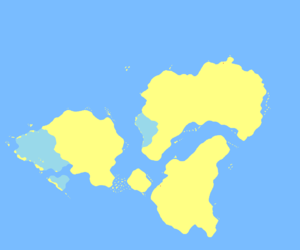
Then Luuk set sail. In the vicinity of the Skerry Isles Luuk steered the ship towards the Beneluccas. Just before the coast the ship anchored. With small motorboats Luuk and a group of men went through the archipelago and landed in the twilight on the south coast of the northern island, the island Erasmus. They headed north under the cover of darkness. All this in the deepest secrecy to avoid being discovered by the Calbian. It took them a day to cross the island on foot, without using the beaten track and as far as possible out of sight.
They managed to reach the former Vinandy estate. It was deserted except for the wild animals from the neighbouring nature reserve who had now moved into the estate. In the early morning the expedition entered the estate. Luuk knew exactly where he had to be, the king had explained it to him in detail. He had learned the maps and building plans by heart, so he had no papers with him. When they were on the estate and walking towards the big mansion, suddenly a plane came flying. They quickly ducked to avoid being seen. What flag the plane flew was not important. They just didn't want to be seen. Now Luuk said to act quickly, if they had seen something, they did not have much time left.
When the plane had gone, they hurried to the manor house. There they walked through the rooms, with Luuk in front. As if Luuk had been there for years, he walked through the corridor and rooms. Until he came to a wall. On the wall a flower motif had been painted, but exactly as the king had said. There were two different flowers in the pattern. Luuk pressed on them and the wall slid open, creaking and squeaking. A small narrow corridor and stairs became visible. Luuk quickly switched on his torch and they went into the corridor. Two men stayed behind to guard the entrance. The stairs led the men far underground, into a kind of crypt. There were no graves, but a large space with brick arches. Under the reign of Arkadius IV, all graves had been moved to the family graves in Vinandy. One thing had been left behind. That was what Luuk came for.
In the back wall was a cavity. There stood a sword. The sword "Pureté", made of Valtian steel, which Arkadius III had received at his coronation. It was one of the three gifts Arkadius III received, besides jewels from Natopia and an elephant from Babkha. Those jewels would have been taken by the first wife of Arkadius IV, when she left Batavia. And the elephant, of course, was already dead. Only the sword was still there, here in this crypt. Luuk took the sword, wrapped a cloth around it and put it in his backpack. He nodded to his men and left the room. Upstairs they closed the secret door again, trying to cover their tracks. They left the estate, having checked that there was no plane in the vicinity.
They quickly headed south again. When they finally returned to the spot where they had landed, they checked for any other ships. As the sun set, they left the island. Here, too, they covered their tracks in the sand. Luuk still had a double feeling. The mission had succeeded, it seemed, but it went too easily. That was the feeling he had. And that feeling turned out to be right. When they arrived with the motor boats at the spot where they had left their ship at anchor, the ship appeared to have disappeared. The men looked at each other and asked themselves the same question: where is the ship? They sailed on, around some more smaller islands, but nothing. No ship.
"What now?", one of the men asked Luuk. He thought for a moment and said, "Let's go where the city of Ruhatyn once was." The motorboats turned around and headed towards the former Ruhatyn. It was already night when they arrived. The outlines of the ruins were no longer distinguishable against the dark sky. Only at sunrise could they make a plan. Luuk ordered one of the motorboats to sail back to where the ship had been abandoned. While the rest of the men went to improve the hastily set up camp. They had taken up residence in one of the buildings, which turned out to be the old headquarters of the Iron Company.
They managed to get in radio contact with the ship. "Where are you?", Luuk asked. The captain answered: "We are moored in Portpur". Luuk looked at his companion next to him and asked, "What are you doing there? Why are you chained up?" The captain replied, "We were intercepted by the navy of West Skerry and Sri Pashana. And in order not to attract too much attention, we cooperated to sail to Portpur. There we were detained, because we were flying the Arbor flag, while we are Batavian citizens. That is of course suspicious, so to avoid conflict..." Luuk said, "You have acted correctly." Then the men tried to work on a solution, but it was not so easy. A diplomatic conflict had to be avoided.
"Hoist the flag", Luuk ordered. To the sound of trumpets the Batavian flag was hoisted. Luuk took the podium and said, "In the name of the King, we hereby claim this land." The men cheered! After this, Luuk let out a message to inform 's Koningenwaarde that the kingdom had grown larger. The message concluded with: 'The point is at the end'.
In the name of justice

The Emir sighed. This trial had already lasted too long. Six years after the event, six years the accused had been in custody. Too long. That's why Emir wanted to end the case, a ruling for justice. The Emir was troubled by it. But now the moment has come. He nodded to the messenger, who announced him in the hall. After the announcement, the Emir stepped into the courtroom. The people were waiting in the courtroom for the moment that Emir sat down, so they could sit down too. Just before the Emir sat down, he glanced at the suspect, who stood handcuffed between two guards. He sat down.
"The hearing is hereby opened. The case is about the assassination attempt on the Sultan of Çakaristan," the Emir said and banged the hammer. The prosecutor made it clear that he wanted the floor to make his plea. Only the Emir did not allow it and ordered: "Undo those handcuffs". The guards hesitated, it was an unexpected command. "Well, will something come of it", said the Emir irritated. The guards followed the order. "Thank you," said the suspect. The Emir looked surprised, after all this was the first thing the suspect had said in months. Allegedly in Çakaristan and certainly after his arrival in Arbor, the suspect had said nothing. No question answered. Not even his name was known.
"Good," said the Emir, "You know why you are here?" "Yes indeed," said the accused. There was some commotion in the courtroom. "You are suspected of an assassination attempt on the Sultan of Çakaristan. Do you consider yourself guilty?", asked the Emir. "Yes, I am guilty," said the accused. Emir was surprised and responded, "If so, then I can convict you immediately. Only, why?" The defendant remained silent and bowed his head. "Something tells me, sir, that you had a reason for the attack," the Emir continued. The defendant looked up again, but still said nothing. The Emir insisted: "Can you tell me what is going on?" The defendant sighed and looked at the Emir.
"Your honour, your majesty, my name is Yazik, son of Aykut Kökgül. My father died in Kila Qandagozar, leading his men during the Sylvanian National Awakening. The last stand of those 21 men has become legendary. Only, the reinforcements led by Ümit Çakar came too late. Even with half the troops that eventually came, a difference could be made. The position in Kila Qandagozar had geographical advantages. The enemy's advance, which had to pass through the narrow valley towards Akyar, passed right by Kila Qandagozar. This is the overview of the situation. But if we zoom in on that situation, we see a deliberate sacrifice of 21 human lives.
How do I know this? I myself was present in Ümit Çakar's headquarters as a liaison officer. Together with my colleagues, we passed messages to the war room. There, Ümit Çakar and his officers made decisions about the deployment of troops. When the first reports came from Kila Qandagozar that the enemy was advancing, messages were sent to other units. A pattern of checkpoint raids became apparent, so in fact before the enemy came into view at Kila Qandagozar, the pattern was already evident that Kila Qandagozar would be next. But despite that pattern, despite the initial reports, Ümit Çakar decided not to send reinforcements.
And how this became clear is because several units reported that they were ready to advance towards Kila Qandagozar. Including Hasan with his men, who was too far away to arrive in time, but realised that a possible fall of Kila Qandagozar would be a strategic mistake. Hasan pleaded with his father to send troops, but he refused. Kila Qandagozar was hopelessly lost, was the reasoning. But a message went out to Kila Qandagozar to stand firm. My father followed that up, despite the fact that it would be a suicide mission. He was kept on a leash by messages that reinforcements would be on their way, but no messages were sent to gather troops. So no reinforcements were organised. Ümit Çakar left the headquarters that evening, a young woman was seen entering his bedroom not much later. I didn't see that woman leave until the next morning. Then we probably don't need to guess what that woman was doing there.
The next morning troops were ready to move in of their own accord. So when Ümit Çakar had finished his breakfast, the available troops could be assembled quite quickly. My father was already dead, only then did the troops advance and arrive at Kila Qandagozar. I buried my father, together with his men. My father has been betrayed. My father has been abandoned. Then I went to Agra. There was a meeting going on, where they were talking about choosing a sultan. They expected Ümit Çakar to be chosen. After all, he had led the rebellion, so they said. With that in mind, I prepared my bow and arrow. I could easily hide that among the merchandise I was taking with me. A gun would be discovered by the guards, but because I had hidden my bow in parts, it would not be discovered.
Then the moment came when the elected sultan was proclaimed. I was hiding in a high place to hit Ümit Çakar with an arrow. Concentrating, I aimed my arrow, when the sultan on his horse came around the corner. Only when I saw that not Ümit Çakar had been chosen as sultan, but Abu Çakar, the string of my bow was already at my fingertips. I managed to deflect the arrow slightly, but it still hit the Sultan. I thank the great Craitgod that the Sultan is still alive. May he reign forever!"
The Emir had to digest the whole story for a while and suspended the session. After the adjournment, the Emir asked the prosecutor if the story was true. "As far as we have been able to verify, this is true," the prosecutor said. "Well," began the Emir, "Yazik Kökgül, my verdict is as follows: you have acted with premeditation to kill Ümit Çakar, thinking that he would be elected sultan of Çakaristan. You accidentally shot and wounded Abu Çakar. Fortunately for you, your shot was not fatal and the sultan recovered. I cannot sentence you to death, because your arrow did not claim any life. However, you have endangered a young nation by shooting the newly elected Sultan. You have only just given your account and remained silent before. Therefore I sentence you to life-long exile. You are not allowed to enter Çakaristan anymore. This is my ruling, you will have to make do with it." The Emir struck with his hammer.
Rhythm of hips
Fatima was very happy that her husband was back home. The Emir had been in Madinat al-Fath for months, where she had of course visited him, but Al-Hamra is the real home. She doubted the judgment Mahmud had passed on Yazik Kökgül. But she did think that the verdict showed compassion. But did the verdict do justice to the situation? She doubted it. She was nervous that if the verdict was not fair in the eyes of the great Craitgod, would the Emir pass the Gate of Justice unharmed?
Yet she had made preparations for a feast. She sang songs, she prepared the food, she dressed herself beautifully and everything was neat and tidy. She would welcome her husband to the fullness of her love for him. From the highest tower of the palace she could see the Emir's plane arrive. After that, it would not be an hour before the Emir would come home. The guard of honour was ready, the red carpet rolled out. Fatima made one more prayer to the great Craitgod for mercy. The column of cars arrived in front of the palace, the Emir got out. Immediately music was played. Fatima smiled at the sight of her husband. Still getting a warm feeling from her husband, she muttered, "أتمنى أن يعيش إلى الأبد!" (May he live forever!)
They embraced each other, but kept in mind that everyone could see them now. They walked to the gate. The dreaded Gate of Justice. Mahmud did not seem to fear for a moment and told Fatima about the journey. She nodded in agreement, but did not actually listen. The two of them walked through the gate without anything happening. Fatima sighed in relief, Mahmud looked at her in surprise. "My lover? What is that sigh?", Mahmud asked. She looked at the ground, like a child caught picking mother's roses. Then she looked at him and said, "My husband, that verdict is just, despite the fact that she wanted to kill a follower of the great Craitgod." The Emir replied, "How could I judge otherwise, no life was claimed?"
Mahmud was surprised by the party his wife had prepared. He didn't need it, he thought. But he was still very happy with the reception. First he played with his children. After a while they had to go to bed. In the courtyard the Emir was served music and dance. The sweet wine flowed abundantly. Dates, figs, grapes and all kinds of delicacies were brought in continuously for all the guests. Of course, the traditional belly dance could not be missed. An enchanting belly dancer came forward and the music slowly began to play. The air of the sultry summer evening seemed filled with temptation. The music stirred up temptation. The dancer's belly moved in slow motion as everything began to spin. Her hips moved rhythmically as the world around her faded away. Mahmud had déjà vu of his poisoning. He dropped his cup of wine, but the music continued. And he fell into a deep sleep.
The sparrows whistled their song. Mahmud opened his eyes and saw the blue sky. Two sparrows flew after each other. Slowly Mahmud remembered what had happened and wanted to get up. But he went too fast and fell back on his couch. He heard a groan next to him, looked and saw his wife slowly getting up. Had she lost consciousness too? What had happened? Together, Mahmud and Fatima tried to find out what had happened. The staff and the children did not seem to be different for a moment. As if nothing had happened. Mahmud's eyes widened when he saw that the view was different. The palace was the same, but the outside world was different. It seemed as if the whole palace had been lifted up that night and put in a different place.
A servant reported that the Grand Vizier was making his appearance. The Emir asked the Grand Vizier if he knew what was going on. But the Grand Vizier did not know what the Emir was talking about. Their conversation led to nothing. Mahmud thought he was going mad. Fatima got a Micras map and asked the Grand Vizier, "Where are we?" He pointed to an island off the coast of Apollonia. Mahmud looked surprised and said, "Really?" The Grand Vizier became nervous and explained that Arbor had been there since its foundation. Fatima said, "Thank you, Grand Vizier. The Emir needs time to think." The Grand Vizier left in confusion. "My husband, whatever has happened, let us thank the great Craitgod that we may live." Mahmud agreed and after a good meal they sat together enjoying their new view. The new Arbor, the Emirate of Arbor in Barikalus.
Better a good neighbour than a distant friend
"Take a good look, Hakim," Mahmud said to his son, who was looking over the Gulf of Peace with binoculars. In the distance, an aircraft carrier lay at anchor. "Dad, a boat is approaching the aircraft carrier now," said Hakim. "That will be the Hurmudan senators," replied his father. Mahmud sat down next to his wife. Together they enjoyed the pleasant weather, sunny and a light breeze. But especially that all their children were around them. Servants came to fill the table with tea, fruit and other delicacies. Mahmud thanked the servants, who left the terrace again. On the aircraft carrier were a delegation of government officials, including the Grand Vizier, Mustafa Asada. Also present were Çakari diplomats, who had worked to establish diplomatic relations between Arbor and Hurmu. The aircraft carrier belonged to Arbor before, as it was part of the Storish armada, which had been given to Çakaristan.
Jan Spiik felt anticipation in his body while standing on deck on the Hurmu state yacht, as the yacht was approaching the Çakari aircraft carrier. For being a yacht, it was not a tiny ship. Her length was 130 metres – nothing impressive at all when compared to the size of the carrier. In any case, Jan Spiik felt much anticipation. He and his senatorial colleague – Catarina de Todos los Santos u-Kart – would be the first Hurmudans to even meet the Emir of Arbor and his family. Arbor had long been a reclusive state. The Amokolian and Batavian revolutions had changed the former Frankish emperor. He had converted to a new religion, found peace in his soul, and took his new emirate in a self-isolating direction. Now was the time for Arbor to open up. Enough meditation had occurred, now was the time for friendships to emerge. The Emir was known to be looking out, being more confident in his country's role in the world.
The Hurmu Executive, dominated, but not fully controlled, by Humanists (or Livvists as they were called by the Arborics), had been weary of any relations between Arbor and Hurmu. After all, Arbor had refused to enter any kind of relations with any member state of the Raspur Pact, and given Hurmu's deep relations with these countries, the Executive had blocked all moves for the Senate to normalise relations with Arbor. Finally, in 1693, the Senate managed to convince the Executive that it would be in the best interests of Hurmu to let by-gones be by-gones. Hurmu is both a neutral and friendly country, it is possible for Hurmu to establish friendships with all countries. Arbor would be a good testament of that.
As such, the Senate, having secured the permission of the Parlerment and the Executive, dispatched senators in secret to Çakaristan for negotiating with Arboric diplomats there for normalisation of relations. Now, after slightly less than a year of negotiations and consents sought and granted from governments and legislatures, the final deal would be signed off. In the last weeks before the the treaty was to be signed, the Arboric delegation made a surprise offer of gifting Bur Astir to Hurmu. Hurmu's diplomats were taken aback at this surprise offer, but they were quickly convinced that it was a genuine offer from Arbor with few strings attached.
"The roots of the Lady Esther Isles are in their Hurmu heritage", an Arboric diplomat had uttered. "The Emira, being descended from the Lady Esther of Hurmu, feels that this would set the record straight. Let Hurmu have what is Hurmu's." The Arboric government then sent a few hundred carton boxes with papers and documents related to the Bur Astir area, with several blue papers on the feasibility of its handover to its spiritual predecessor. A few weeks later, Hurmu's government had agreed. The gift of East Barrow Island, as it would be known in Hurmu, was a token of great friendship from Arbor, a signal that Arbor takes its obligations under international law seriously, and that Arbor will stand by Hurmu.
Now it was for Hurmu to reciprocate, to sign this treaty, and make this relationship one built on friendship and good neighbourliness. Jan Spiik felt anticipation, but a sense of pride too. He had been selected to witness this historic occasion.
Formation of a border
It had been a while since a treaty had been signed with the neighbour to the north. A treaty of mutual respect and cooperation. The Emir read the report again. And a few things struck him.
"Leading up to the signing of the treaty between the Emirate of Arbor and the Grand Duchy of Lac Glacie, scheduled for 1.XII.1694 AN, the talks took place in the city of Cognito. The exact position of the border between the two nations was determined. Originally, the border of Arbor was to be much more northerly, so that the cantons of Cognito, Jacaringia and Jardinais of the Grand Duchy would end up within the borders of the Emirate. But since the emirate had not yet laid claim to the area and there was a firm desire for friendly relations with its prospective northern neighbour, the boundary was drawn more southerly."
The Emir called the Grand Vizier and summoned him to come. When the Grand Vizier stood before him, the Emir read the report and said: "Your Excellency, when I read this report, a few things struck me. And I quote 'because the Emirate had not yet laid claim to the area'. Can you explain to me what is meant by this?" The Grand Vizier replied and said, "Your Majesty, forgive me for asking you why you are reading this report." The Emir became angry and snarled, "Please answer my question." The Grand Vizier was startled by the sudden anger and replied, "Your Majesty, our northern border was unclear for a long time. After all, we had no northern neighbour, so somewhere there was a demarcation where the emirate extended. With the arrival of a northern neighbour, we have formalised the border."
The Emir pulled out another document and said, "Looking at the registration of claims, I see no ambiguity about the northern border. It is good that we have made friendly agreements, but there was never any ambiguity. On top of that, we are involved in Operation: Blue Carpet. An anti-piracy mission in the Eastern Ocean, which was clearly directed against the Iron Company. How can you explain all this?" The Grand Vizier replied and said, "Your Majesty, with all due respect, but you are connecting unrelated issues. The important thing is that our emirate strives for good relations with other nations on Micras, is rooted on this continent and helps friends against threats." The Grand Vizier bowed and left the room backwards. The Emir was left sulking.
Arriving at the chancellery, the few of the viziers had gathered for a meeting with the Grand Vizier. When the doors were closed, the Grand Vizier said: "Our Emir continues to deal with the relocation of our country. I was questioned like a caught child. If the Emir starts to realise that we are in control, we are finished. We have to make it appear that our Emir has gone mad. Then we can depose him and send him into exile. Especially now that his son is approaching adulthood." One of the viziers asked, "Do we want his son to become our puppet Emir then, or isn't it better that you become Emir?" "I am not sure about that yet," said the Grand Vizier, "only that Mahmud should be dethroned." The other viziers nodded in agreement.
Three camels
The Emira had come to know that the Grand Vizier had a shadow plan to get rid of her husband. She took precautions to bring her children to safety. Her husband did not yet want to know of any plot against him, but could not refute his wife's arguments. Fatima had therefore invited two old acquaintances, loyal friends, to talk to her husband.
The Emir was pleased with the arrival of James and Ana. Together they recalled stories from Frankish times. The tensions surrounding the Second Amokolian War. Ana said, "Still a pity that the computer virus in the enemy military systems didn't have to be activated." James laughed, adding, "It would be a spectacle to see those systems fail." "I wonder if the computer virus is still there and can still be activated," Fatima said. The Emir greyed as he stroked his beard.
"Still, I like your action best, Ana, that murder of Constantine Loup", said the Emir in a hoarse voice. James said, "Nice work, indeed." It remained silent for a moment.
James sighed deeply, and turned to his old friend. He said: "The reports indicate that Mustafa is turning against you. He has control over the army, there are indications that you and your family are in danger". The Emir looked away from James, but saw the worried faces of the others. "Okay," said the Emir sighing. "What's the plan?" Ana said, "There are ships of mine going to and from the port of Madinat al-Fath". The Emir nodded and said, "Only Mustafa is not stupid, of course. So he will search your ships, if we go missing." "Right," said James, "all the more so because the Khalij al Salam counts as territorial waters. It just takes too long for a ship to leave the bay." The Emira said, "Using a small boat to transfer from this island to another ship is not likely either, as work has taken place." "Yes, that's right," James said, "all sorts of surveillance sensors have been installed. So even a submarine is being observed". "All to guard me...", said the Emir. All chuckled.
"Well," said the Emir after a while of silence. "Still, there are some other options. But we must avoid being suspected of wanting to leave the country. To begin with, you must not come here again, Ana and James. Ana for you it has to be as much as possible: business as usual. James, you are going to organise the escape." James grinned and got excited at the idea of a grand plan. Ana nodded and replied, "I won't even show myself in this country anymore." The Emira didn't know how to behave for a moment, but calmed down when she looked at her husband. He had a plan.
For months all went their separate ways. There was no contact, only an untraceable satellite phone was the only means of contact between the Emir and James. At the same time, the Emir had said nothing more about the move of Arbor. The Grand Vizier seemed increasingly confident in his position of power. He had had a new palace built in Madinat al-Fath, there were rumours of a large number of women staying in that new palace. Through James, the Emir had recruited a number of women as informants. Conversely, the Emir knew that in his palace in Al-Hamra there were spies for Mustafa. But the Emir knew who the spies were and who could be trusted.
It took almost a year before the moment of truth came near. The Emira knew nothing, and so did the children. Several times they had visited together, as a couple or as a family, different places in the country. Because no strange things happened during all those visits, the Grand Vizier had no suspicion about their plans to leave the country. This time, the family was going to Craitabad. There, the great temple was to be visited. On the way to Craitabad, the Emira and Emir had an amicable conversation. In the middle of the conversation, the Emir said: "It's like the fairy tale of the three camels". That was the code word. Astir asked her mother, "I don't know that fairy tale." The Emira nodded and started telling the fairy tale.
On arrival in Craitabad, the programme of the visit was followed. The people were excited about the arrival of the whole family. After some parts of the programme, the family entered the temple. There they were alone with the clergy. Even the bodyguards were outside and had locked the temple. The clergymen started chanting, while the doors of the main hall were closed. The "three camels" operation began. The temple had several corridors, including secret ones. Some clerics guided the family through the maze of corridors.
In the deep cellars under the temple, the family came to a room where cars were waiting. The cars left in three groups and drove through the city. The first group drove to the airport. There, a private plane was ready to take off. The second group drove to the harbour, to a pier where a ship was moored. The third group drove south to Vathia. At the same time, the clergymen kept singing and pretended that the Emir's family and Emira were still in the temple. After two hours, the head of the bodyguard got suspicious and tried to find out what was happening in the temple. He hesitated, so he contacted Madinat al-Fath. No one there wanted to make a decision, so the Grand Vizier had to be asked. Only he was busy, he did not want to be disturbed.